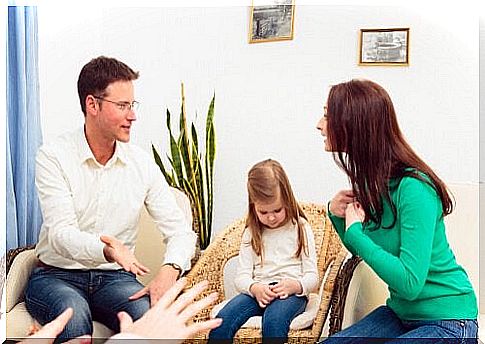Things Parents Should Not Say Or Do In Front Of Children

Most children tend to imitate what their parents say or do, so we need to pay close attention to our behavior and know what things we as parents should not say or do in front of them.
Children understand and absorb much more than we think.
They learn by observing everything we do, and that affects how they act in the future. Therefore, we must avoid certain behaviors and problems until they can better understand the context.
When they are very young, children can interpret the world from a very unique perspective. They understand and absorb much more than we think, but at the same time they are very literal.
Even if they understand a general concept , they can not grasp the nuances, expressions and metaphors we use. For example, if we say that the neighbor has crow’s feet, you should not be surprised if the child thinks she has legs like a bird.
Nor can they understand irony, sarcasm or double meanings. They do not understand that we can say anything in the heat of battle that we later regret. All these nuances that children can not yet understand lead to great momentum in their imagination.
Because they are best at understanding non-verbal language, that is, our body language, they will perceive the feeling in the situation, and it gives things that they do not yet understand an emotional charge.
This can lead to most problems. We do not just mean embarrassment when children start gossiping; Even more worrying are situations where our children feel confused or divided without really understanding why.

Imagine this: you have had an intense discussion with your parents and are now ventilating for your partner. Your child is present and understands that you are angry at the grandparents, whom he loves very much.
How is he? In his opinion, anger arises when someone has done something wrong. Are the grandparents bad? How should they be treated? What will happen? What can he do?
The same confusion can arise in many different situations. Without realizing it, we discuss topics that children are not ready to understand or can misinterpret, such as relationships, friendships, school or ” adult problems ” , and this can lead to confusing feelings.
We must pay attention to what we say in front of children, but without it preventing us from communicating with them.
Here is a list of topics we should try to avoid talking about in front of the children:
1 . Talking bad about other people. This also applies to gossip. Children, often the younger ones, cannot understand these private comments or our role in them. As I said, they can feel confusing, divided and even guilty.
2. “Adult” clouds of unrest. Money, time, food… it is not good to let such clouds of unrest affect our children. When they grow up, we can explain it, but always in a way they can understand. Burdening their children with problems is something parents should not do.
3. Speak in front of children as if they were not there. Stamping them and making comments about their physical appearance or intellect, especially negatives, can lead to complexes.

We must also take into account the tone we use or the attitude we display. For example, shouting, even if it is not aimed at children, will only block, scare and confuse children.
At the same time, we must avoid lies, because children get used to avoiding the truth when it is convenient for them.
Just because we have to pay attention when we speak in front of children does not mean that we have to cut off all communication in their presence. It can actually be negative for them, because they may start to think that they are bothering you or that you do not want to be near them.
All we need to do is reflect a little and put ourselves in their shoes. A good way to get us thinking is to pretend that the conversation is being recorded. Think about your words, your attitude and the image you project.
We also need to think about whether what we say or do can confuse children. So try to understand how it can affect them.
Finally , it is recommended to use clear and direct language in their presence. At an early age, children cannot understand metaphors and puns.
If we avoid using such expressions, we can prevent a lot of confusing emotions from occurring. Since we cannot always control ourselves , it is important that we try to get the children to understand the context so that they do not interpret our anger as their own fault.
It is important to sort out the confusion for the sake of the children’s growth and to strengthen your relationship. What we have gone through, however, are just a few things that parents should not do in front of their children!









